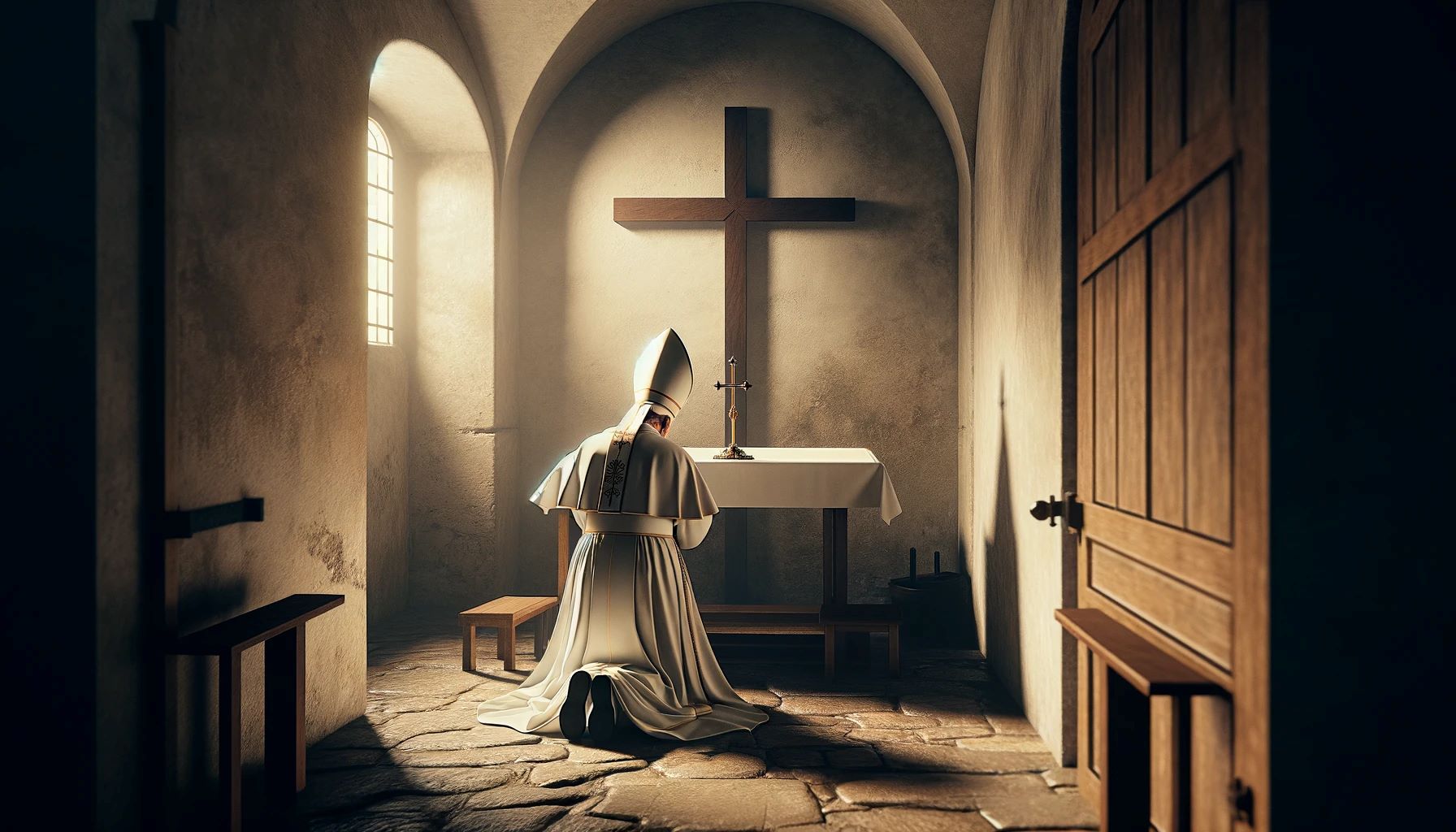Home>Theology and Spirituality>How To Go To Heaven In Catholicism


Theology and Spirituality
How To Go To Heaven In Catholicism
Published: February 15, 2024
Jason DeRose, Managing Editor at Christian.net, uses his expertise in religion and journalism to deepen understanding of faith's societal impacts. His editorial leadership, coupled with a strong academic background, enriches the platform’s diverse content, earning him recognition in both journalism and religious circles.
Discover the path to Heaven in Catholicism with our comprehensive guide on theology and spirituality. Explore the teachings and practices that lead to eternal salvation.
(Many of the links in this article redirect to a specific reviewed product. Your purchase of these products through affiliate links helps to generate commission for Christian.net, at no extra cost. Learn more)
Table of Contents
Introduction
The concept of Heaven holds a profound significance in Catholic theology, offering a glimpse into the eternal reward promised to those who lead a virtuous life in accordance with the teachings of the Church. Rooted in the belief in an afterlife, Heaven represents the ultimate destination where the faithful are united with God in a state of everlasting joy and peace. For Catholics, the aspiration to attain Heaven serves as a guiding principle, shaping their moral choices and spiritual journey on earth.
The Catholic understanding of Heaven transcends mere wishful thinking; it is deeply intertwined with the core tenets of faith, morality, and salvation. The prospect of Heaven serves as a source of hope, inspiring believers to cultivate virtues, seek reconciliation, and embrace the sacramental life of the Church. Moreover, the concept of Heaven underscores the profound love and mercy of God, who offers the promise of eternal bliss to those who earnestly strive to live in accordance with His will.
As we delve into the intricacies of how to attain Heaven in Catholicism, it is essential to recognize that the journey is multifaceted, encompassing moral living, participation in the sacraments, seeking forgiveness, and nurturing a profound relationship with God. This exploration will shed light on the rich tapestry of Catholic beliefs and practices that guide individuals on the path to Heaven, offering insights into the spiritual landscape that shapes the lives of millions of faithful adherents around the world.
With this in mind, let us embark on a journey to unravel the profound significance of Heaven in Catholic theology and explore the transformative principles that underpin the quest for eternal salvation. Through this exploration, we will gain a deeper understanding of the profound spiritual aspirations that animate the hearts and minds of those who seek to embrace the promise of Heaven in the Catholic tradition.
Understanding the Catholic belief in Heaven
The Catholic belief in Heaven is rooted in the fundamental understanding of God's infinite love and mercy. According to Catholic theology, Heaven is not merely a symbolic concept or a utopian ideal, but a tangible reality where the faithful are united with God in a state of perfect happiness and fulfillment. This transcendent realm is envisioned as a place of eternal peace, where the righteous experience the fullness of divine love and joy in the presence of God.
Central to the Catholic understanding of Heaven is the belief in the resurrection of the body. This doctrine holds that at the end of time, the souls of the departed will be reunited with their glorified bodies, and together they will experience the fullness of God's presence in a renewed and perfected creation. This belief underscores the holistic nature of salvation, affirming the significance of both the spiritual and physical dimensions of human existence.
Moreover, Heaven is perceived as the ultimate fulfillment of the human longing for union with God. It is a state of beatitude, where the faithful are liberated from all forms of suffering, sin, and imperfection. In this celestial abode, the redeemed souls partake in the divine life, sharing in the boundless joy and glory of God for all eternity.
The Catholic tradition also emphasizes the communal aspect of Heaven, portraying it as a place of communion and fellowship among the saints and the angels. This vision of Heaven as a harmonious community reflects the interconnectedness of the mystical body of Christ, where the faithful are united in a bond of love and solidarity, transcending the limitations of time and space.
Furthermore, the Catholic belief in Heaven is intricately linked to the concept of judgment, where individuals are held accountable for their actions and are ultimately rewarded with the gift of eternal life or face the consequences of their rejection of God's love. This understanding underscores the moral dimension of human existence and the significance of living a life in accordance with the teachings of Christ and His Church.
In essence, the Catholic belief in Heaven encompasses a rich tapestry of theological insights, spiritual aspirations, and moral imperatives. It serves as a beacon of hope, inspiring the faithful to lead lives of virtue, seek reconciliation, and cultivate a deep relationship with God. This profound understanding of Heaven shapes the moral consciousness of Catholics, guiding them on a transformative journey towards the ultimate fulfillment of their deepest longings in the embrace of divine love.
Living a virtuous life according to Catholic teachings
Living a virtuous life according to Catholic teachings is foundational to the pursuit of Heaven. Central to Catholic moral theology is the concept of virtue, which encompasses a set of moral and spiritual qualities that enable individuals to align their lives with the divine will of God. The Catechism of the Catholic Church delineates the cardinal virtues of prudence, justice, fortitude, and temperance, along with the theological virtues of faith, hope, and charity, as essential for shaping a virtuous life.
Prudence, the first cardinal virtue, guides individuals in discerning the true good in every circumstance and choosing the right means of achieving it. Justice, the second cardinal virtue, calls for rendering to each person their due, fostering equity and harmony in human relationships. Fortitude, the third cardinal virtue, strengthens the resolve to pursue the good despite obstacles and challenges, instilling courage and perseverance. Temperance, the fourth cardinal virtue, moderates the attraction of pleasures and ensures the mastery of instincts, promoting self-control and balance.
In addition to the cardinal virtues, the theological virtues play a pivotal role in nurturing a virtuous life. Faith, the first theological virtue, enables individuals to believe in God and embrace the truths revealed by Him. Hope, the second theological virtue, instills the expectation of eternal life and the grace to persevere in the pursuit of Heaven. Charity, the third theological virtue, empowers individuals to love God above all things and their neighbors as themselves, embodying the essence of Christian love.
Living a virtuous life according to Catholic teachings involves the cultivation of these virtues through prayer, reflection on sacred scripture, participation in the sacraments, and acts of charity and service. It entails a commitment to moral integrity, compassion, and selflessness, as exemplified in the life of Jesus Christ. By embodying these virtues, individuals strive to emulate the moral excellence of Christ, seeking to align their thoughts, words, and actions with the divine precepts of love, justice, and mercy.
Furthermore, the pursuit of virtue in Catholicism is not merely a personal endeavor but is deeply intertwined with the communal dimension of faith. The virtues are nurtured within the context of the Christian community, where mutual support, guidance, and accountability foster the growth of moral character. Through participation in the life of the Church, individuals are encouraged to live out the virtues in their interactions with others, contributing to the building of a society rooted in righteousness and compassion.
In essence, living a virtuous life according to Catholic teachings is a transformative journey that shapes the moral consciousness of individuals, guiding them in the pursuit of Heaven. It is a testament to the profound commitment of Catholics to embody the virtues that reflect the character of Christ, inspiring them to lead lives of moral excellence, compassion, and grace as they strive to fulfill the divine calling to holiness.
Receiving the sacraments and participating in the Church community
Participating in the sacramental life of the Church is integral to the Catholic journey towards Heaven. The sacraments, regarded as efficacious signs of grace, are sacred rituals instituted by Christ to confer divine life upon the faithful. Through active engagement with the sacraments, individuals are nourished, strengthened, and sanctified, enabling them to grow in communion with God and the Church community.
The Catholic Church recognizes seven sacraments, each bearing unique significance in the spiritual life of believers. The sacraments of Baptism, Confirmation, and the Eucharist, known as the sacraments of initiation, mark the foundational stages of Christian life. Baptism, the gateway to the sacramental life, cleanses individuals from sin and initiates them into the body of Christ, the Church. Confirmation bestows the gifts of the Holy Spirit, empowering individuals to bear witness to the faith, while the Eucharist, the source and summit of the Christian life, nourishes the faithful with the body and blood of Christ, fostering intimate communion with the Lord.
Furthermore, the sacraments of Reconciliation and Anointing of the Sick offer profound avenues for spiritual healing and restoration. Reconciliation, also known as Confession, provides the opportunity for individuals to seek forgiveness for their sins, experience reconciliation with God and the Church, and receive the grace to amend their lives. The Anointing of the Sick, administered to the ill or those facing significant health challenges, brings the comfort of God's presence, healing grace, and strength to endure suffering in union with Christ.
Marriage and Holy Orders, the sacraments of vocation, confer grace upon individuals called to the sacred commitments of married life and ordained ministry, respectively. Marriage sanctifies the union of spouses, empowering them to reflect the love of Christ for His Church, while Holy Orders ordain individuals for the service of God and the Church, bestowing upon them the grace to fulfill their sacred duties.
In addition to the sacraments, active participation in the Church community nurtures spiritual growth and solidarity among believers. The communal worship, fellowship, and shared mission of the Church foster a sense of belonging and support, enabling individuals to grow in faith, love, and service. Through engagement in liturgical celebrations, prayer gatherings, charitable activities, and spiritual formation programs, individuals are enriched by the diverse gifts and experiences of the community, strengthening their resolve to live as disciples of Christ.
The sacraments and participation in the Church community serve as transformative pillars that sustain and nourish the spiritual journey of Catholics, guiding them on the path towards Heaven. By embracing the grace and communal support offered through the sacraments and active engagement in the life of the Church, individuals are empowered to deepen their relationship with God, grow in holiness, and contribute to the building of a vibrant and compassionate Christian community.
Seeking forgiveness and reconciliation through confession
Seeking forgiveness and reconciliation through confession holds profound significance in the Catholic faith, offering a transformative path to spiritual healing and restoration. The sacrament of Reconciliation, also known as Confession, embodies the merciful embrace of God, inviting individuals to acknowledge their shortcomings, seek forgiveness for their sins, and experience the liberating grace of reconciliation with God and the Church.
Central to the sacrament of Reconciliation is the act of contrition, wherein individuals express genuine sorrow for their sins and a firm resolve to amend their ways. This heartfelt contrition reflects a deep awareness of the moral implications of one's actions and a sincere desire to be reconciled with God and the community of believers. Through the act of contrition, individuals acknowledge their need for divine mercy and express a genuine commitment to embrace a life rooted in virtue and grace.
The sacrament of Reconciliation also entails the confession of sins to a priest, who serves as a minister of God's mercy and absolution. In the sacred space of the confessional, individuals are invited to honestly and humbly recount their sins, knowing that they are received with compassion, understanding, and confidentiality. The priest, acting in persona Christi, offers counsel, guidance, and absolution, imparting the liberating grace of God's forgiveness and reconciliation to the penitent.
Moreover, the sacrament of Reconciliation fosters a profound encounter with the mercy of God, who eagerly awaits the return of the repentant sinner. Through the absolution pronounced by the priest, individuals are assured of the pardon of their sins, the restoration of their spiritual well-being, and the renewal of their communion with God and the Church. This transformative encounter with divine mercy instills a sense of liberation, peace, and joy, enabling individuals to embark on a renewed journey of faith and moral integrity.
Furthermore, the sacrament of Reconciliation serves as a powerful means of spiritual healing and growth, enabling individuals to confront the roots of their sins, receive the grace to overcome spiritual obstacles, and experience the transformative power of God's love. By engaging in the sacrament of Reconciliation, individuals are invited to embrace the path of ongoing conversion, seeking to align their lives more closely with the teachings of Christ and the moral precepts of the Church.
In essence, seeking forgiveness and reconciliation through confession is a profound expression of the Catholic belief in the boundless mercy of God. It is a sacred journey of self-examination, contrition, and restoration, offering individuals the opportunity to experience the liberating grace of divine forgiveness and reconciliation. Through the sacrament of Reconciliation, Catholics are empowered to confront their failings, embrace the transformative power of mercy, and embark on a renewed path of spiritual renewal and moral integrity.
Read more: An Entrance To Heaven: How To Be Saved
Embracing the hope and promise of eternal life in Heaven
Embracing the hope and promise of eternal life in Heaven is at the heart of the Catholic faith, serving as a source of profound inspiration and consolation for believers. The concept of Heaven represents the culmination of the Christian journey, offering the faithful the assurance of everlasting joy, fulfillment, and communion with God. This transcendent hope animates the spiritual consciousness of Catholics, infusing their lives with a sense of purpose, resilience, and unwavering trust in the divine promise of eternal life.
Central to embracing the hope of Heaven is the steadfast belief in the redemptive work of Christ, who, through His sacrificial love and resurrection, opened the gates of Heaven for humanity. The resurrection of Christ stands as a testament to the victory over sin and death, offering the faithful the assurance of sharing in His triumph and partaking in the glory of the heavenly kingdom. This profound hope in the resurrection serves as an anchor for the Christian life, empowering individuals to navigate the challenges and uncertainties of earthly existence with the unwavering confidence in the promise of eternal life.
Moreover, embracing the hope of Heaven engenders a transformative perspective on the transient nature of earthly pursuits and tribulations. The teachings of the Catholic Church emphasize the impermanence of worldly treasures and the fleeting nature of temporal concerns, directing the focus of believers towards the enduring realities of the spiritual realm. This shift in perspective fosters a profound detachment from materialism and a deep longing for the eternal communion with God, inspiring individuals to prioritize the pursuit of virtues, love, and righteousness as they journey towards the heavenly abode.
Furthermore, the hope of Heaven serves as a source of solace and consolation in the face of suffering, loss, and adversity. The Catholic tradition acknowledges the reality of human suffering and affirms the transformative power of hope in sustaining individuals amidst trials and tribulations. The prospect of Heaven offers a vision of ultimate healing, restoration, and joy, instilling in the faithful the courage to endure hardships with the assurance that their present struggles are transient in comparison to the eternal glory that awaits them.
In essence, embracing the hope and promise of eternal life in Heaven is a foundational aspect of the Catholic faith, shaping the moral consciousness, resilience, and spiritual vitality of believers. This profound hope serves as a guiding light, inspiring individuals to lead lives of virtue, compassion, and unwavering trust in the divine promise of eternal communion with God. It is a transformative affirmation that animates the hearts and minds of Catholics, infusing their journey with a profound sense of purpose, resilience, and unyielding hope in the promise of Heaven.














